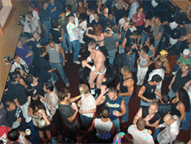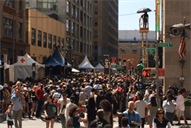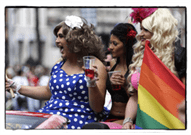How the LGBT community has shaped dance music
Wednesday, June 29, 2016
by Tat
I'm sure readers of this blog will have been shocked and appalled by the Orlando mass nightclub shooting earlier this month. While we have often become desensitized to these events due to their regular occurrence, this one resonated wider and more profoundly than many previous sad events. Whilst this blog is not the place to analyse the attack by a lone, irrational person on a community, it is a relevant platform to reflect on the wholly positive impact made by the LGBT community on dance music. Dance music is a uniting force and has played such an important part in breaking down walls and educating people of different races and sexual orientations. Much of this work is championed by the LGBT community that were attacked without provocation or logical reason. This article pays homage to a group of society that was so dreadfully treated and the important role they played in the thriving dance music scene we see today.
House music for the masses
House music and disco are now music of the masses and whatever shape or form it comes in it has a strong LBGT heritage. From the deepest underground scenes to the commercial high octane, huge stadium dance events, it can all be traced back to the originators of the disco scene. Disco was a highly charged, sexual, flamboyant scene of excess and euphoria, it could not have been any other way. For those who had little or nothing going good for them in their lives it broke the shackles of the daily humdrum. Forty years is not a long time ago, but for many, if you were gay back then it might as well been the stone ages. The forefathers of the modern nightclub created a place where people of all sexual persuasions could dance without fear of bullying and abuse, nevermind the loss of life.
As with northern soul, which was an escape from the 9-5 in grimy factories, it heralded a new era that revolved around the weekend, built around a freedom expression and joy on the dance floor. The disco became a place for those unable to express themselves and their sexuality in normal society in the forms of fashion and dance. The 1970s classic forward-thinking disco was a place where people could be who they truly were, and for many that meant expressing their real sexuality for the first time. The clubs and bars offered safe havens, which sadly proved not to be the case for 49 people in Orlando.
The club names are legendary
Anyone with more than a passing interest in dance music history will know the legendary names of The Loft, Studio 54, Danceteria, Paradise Garage and the Warehouse. These clubs are the blueprints of the modern dance club and were places of sanctuary for the LGBT community. The music, fashion and energy that was witnessed there was very much down to a minority who threw open their arms and nightclub doors to a wider hetrosexual audience. They were the children and for the hetrosexuals who joined them, the stepchildren. This is where the scene grew beyond just a few clubs, as rather than have a gays only policy, many of the clubs allowed everyone in to experience the vibe. As house music grew in the UK and Europe so did the LGBT clubs and like so many of the American originators they opened their doors to everyone with an open mind. In the UK a whole series of popular nights opened at Trade, Queer Nation, Vague and Kinky Gerlinky just being a few of the more notable clubs that built on the legacy.
Where would a dance music scene be without the DJs?
The LGBT scene not only featured many of the boldest characters ever to be involved in house and disco but some of the truly great innovator DJs. Originators such as David Mancuso, Nicky Siano, Larry Levan and Frankie Knuckles to name but a few. Not only did these men play at some of the most legendary and groundbreaking clubs of their time but they also took DJing to another level. The aforementioned DJs helped evolve the role of DJ to one where they no longer just played records, but reshaped them into euphoric all night journeys with their own re-edits, clever mixes and a knowledge of what their knowledgeable, discerning crowds wanted.
It broke down prejudices
Disco, later on house music and to a large extent the rave scene did teach generations about tolerance and differences between people. For many of the large white masses in their provinces, without going to underground clubs and raves they had no, or little experience of people beyond their demographic. Looking back to the early 1970s and now with such as same-sex marriage, LGBT festivals and parades, things have gone forwards, not backwards. I remember going to the local gay bar in my hometown, a place called The Manhattan in the early 1980s. The common joke among locals was not to bend down in the toilets, such was the small town mentality of the 1980s (although it still prevails depending on where you live). What disappointed or shocked me was not the clientele of The Manhattan, I never found that a problem or threat in the slightest. What was the problem for me was the European Hi-nrg music that was being played by the DJ. I still remain convinced to this day it was poor music, but appreciate as with other gay music scenes its huge influence on commercial pop music. Later on as I experienced house music in the late 1980s and early 90s the importance of the LGBT influence began to sink in. As I travelled to Leeds and Manchester with my friends to venues filled with drag queens and people with a different sexual orientation to myself, I saw why these scenes happened and the positive energy they created. What me and my friends found that the clubs were probably the friendliest people and vibes we had ever experienced. Everyone was there for the music, for a good time, it did not matter who you were, what you looked like or who you were with - this much rang true in the rave scene in general. On one occasion we took a fairly straight-laced friend to a gay house club in Leeds, the week after he returned with lipstick, silver hair and outlandish costume. He did not change to fit in, as we often do, but express himself in an environment he felt totally safe to do so in. Those experiences, similar to how hip hop introduced me to friends of a different colour, house music opened me up to another different group of people. They were no different to me, they had the same fears, jobs, problems and sense of humour among other things. We all loved dance music and partying, it showed me that we are no different, and that those who aim to set us apart can never win.
Sadly this blog post could never do real justice to the influence and hard work by the LBGT community on making the dance and popular music scene what it is today. Nevertheless it has helped educate millions of people of all colours and orientations about what makes us different, and how to be tolerant of those differences. The words of murdered politician Jo Cox on her maiden parliamentary speech sums up what many feel from a UK perspective: We are far more united and have far more in common with each other than things that divide us. Regardless of what colour, persuasion, belief we hold, for many of us we all belong to one house nation.
Find music by LGBT artists with Trackhunter on Mac, iOS or Windows







